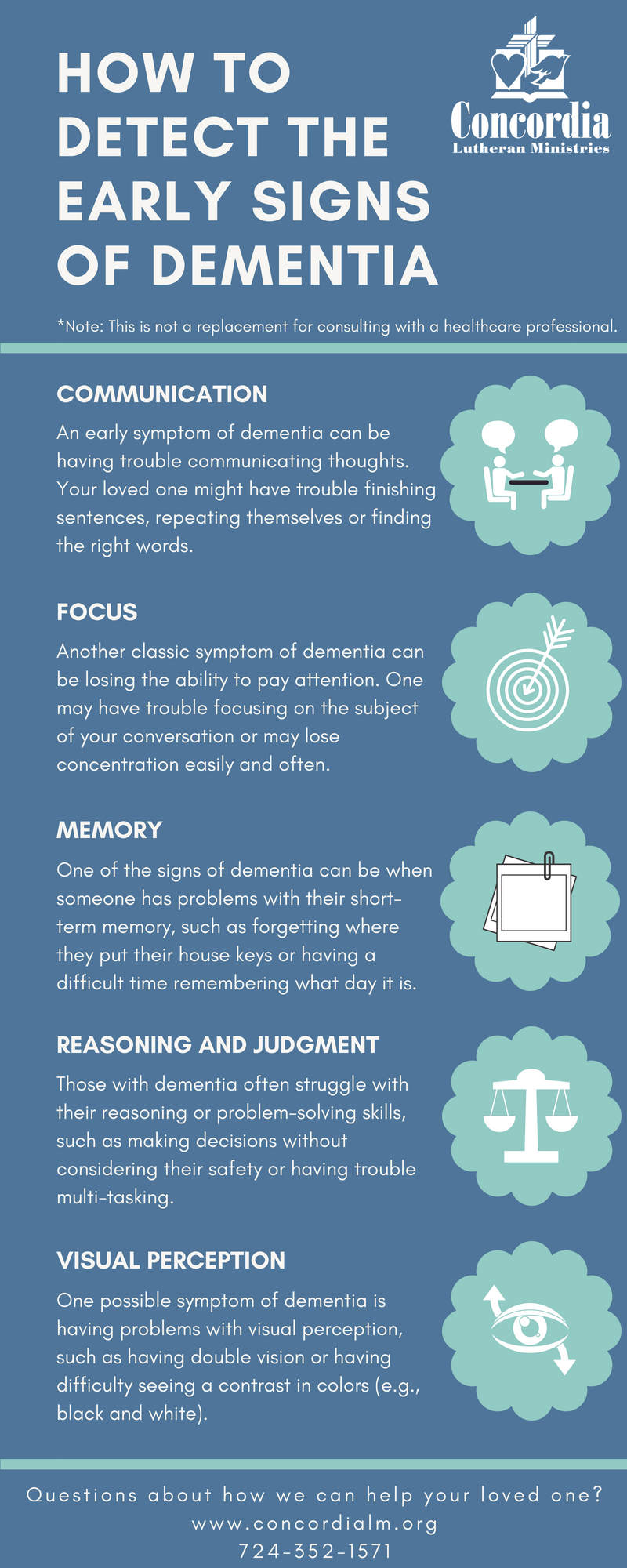7 Early Signs You May Be Facing Early Onset Dementia
7 Early Signs You May Be Facing Early Onset Dementia
Blog Article
Recognizing the Effect of Dementia on Daily Life and Caregiving
Mental deterioration influences everyday life in extensive means, affecting not simply those diagnosed yet also their caregivers. As cognitive decline proceeds, you could observe changes in interaction and regular that obstacle both celebrations.
The Stages of Mental Deterioration and Their Results on Every Day Life
As you browse the trip of dementia, understanding its phases can markedly affect how you handle everyday life. Mental deterioration typically proceeds with 3 primary stages: early, middle, and late.
Throughout the middle phase, you'll experience a lot more obvious cognitive decrease. Daily jobs might come to be challenging, and keeping your self-reliance might require changes. Using reminders and simplifying your environment can help.
In the late phase, individuals usually need significant aid with daily tasks. Preparation for care ends up being essential, focusing on comfort and top quality of life. By understanding these phases, you're much better furnished to react proactively, ensuring you or your liked one can navigate the obstacles with dignity and grace.

Changes in Communication and Social Communication
How do changes in interaction affect your daily communications as dementia advances? As mental deterioration advances, you might observe that straightforward conversations become tough.
You may locate it simpler to attach with these ways as opposed to relying entirely on talked language. Listening abilities can also alter; you could find it tougher to follow discussions or keep in mind what was simply claimed (Frontotemporal Dementia). This can result in misunderstandings or feelings of isolation
Motivating perseverance and creating an encouraging environment can help. Taking part in tasks that promote link, like songs or art, can improve social communications. Bear in mind, keeping partnerships is still possible; it's nearly adjusting to brand-new means of communicating.
Effect on Daily Routines and Activities
While steering everyday routines, you'll likely notice that jobs you once finished easily come to be more tough as dementia progresses. You may find on your own neglecting actions in familiar routines or battling to recall where you positioned products.
Preparation your day can feel frustrating, making it tougher to stay with a routine. You may need reminders for visits or to take medicines. Adapting your atmosphere can assist; as an example, identifying things or using lists can streamline jobs. Involving in repeated, organized activities can likewise give comfort and a sense of achievement. Remember, it's all right to request help. Bordering on your own with supportive friends or family members can make handling these changes a bit easier.
Behavioral and psychological Difficulties
Steering via everyday regimens can produce not just functional challenges, yet behavioral and likewise emotional ones. You may see changes in mood, such as boosted stress and anxiety or aggravation, which can come from confusion or difficulty in completing jobs. As you browse these moments, it is important to identify that your liked one may express their feelings through actions like anxiety or withdrawal.
These emotional responses can be uncertain and may develop without caution, leaving you both feeling bewildered. You could find that familiar atmospheres or regimens can help in reducing stress and anxiety, however preserving patience becomes significant. It is essential to verify their sensations, even if you do not completely recognize them.
The Function of Caregivers in Supporting Individuals With Mental Deterioration
As a caregiver, you play a necessary duty in providing emotional support for individuals with dementia. Establishing daily care routines can produce a feeling of stability and comfort, assisting to alleviate their anxiousness. By recognizing their demands and making use of reliable strategies, you can significantly improve their lifestyle.
Emotional Support Techniques
When taking care of somebody with dementia, understanding the emotional landscape is vital for offering effective support. You'll often discover that persistence and empathy go a long way. Validate their feelings; if they express complication or frustration, recognize it without disregarding their feelings. Basic gestures, like holding their hand or maintaining eye contact, can create a feeling of protection. Try to take part in activities that they appreciate, as this can trigger pleasure and link. Keep in mind to connect plainly and slowly, using wikipedia reference a tranquil tone. Motivate expression through music or art, which can offer as an effective outlet. Ultimately, do not neglect to look after your own emotional demands; looking for support on your own can enhance your capacity to look after them.
Daily Treatment Routines
Developing daily care routines is necessary for giving security and comfort to people with mental deterioration, as these routines can aid lower complication and anxiety. You can start by outlining a regular schedule for meals, tasks, and remainder. This predictability helps your liked one really feel extra protected and involved.
Include acquainted tasks, like folding laundry or watering plants, which can stimulate favorable memories and foster a feeling of success. Usage visual cues, such as checklists or calendars, to assist them via the day.
Be flexible, though; adapt routines as needed based on their mood or power degrees. Frontotemporal Dementia. Keep in mind, your perseverance and understanding are essential in maneuvering their changing requirements, ensuring they really feel sustained and valued throughout their day-to-day life
Creating a Safe and Comfortable Living Environment
Creating a comfy and secure living setting is important for individuals with dementia. You'll intend to make home safety modifications that decrease risks and guarantee familiarity to offer a sense of comfort. By focusing on these aspects, you can help produce an area that supports both safety and well-being.
Home Safety And Security Modifications
As you browse the challenges of dementia, making home safety and security adjustments can greatly improve convenience and safety and security. Tag important areas, such as the washroom and kitchen, with clear indications to help with positioning. These alterations not just promote security yet also motivate freedom, allowing your loved one to really feel even more at ease in their atmosphere.
Convenience and Knowledge
After guaranteeing a risk-free setting with necessary adjustments, cultivating convenience and familiarity is crucial for individuals with dementia. Begin by individualizing their room. Use familiar colors, designs, and pictures that stimulate pleased memories. A preferred covering or chair can give a complacency. Keep a regular regular to help them feel grounded and decrease anxiety. Easy, familiar meals can likewise produce a soothing ambience. Maintain paths clutter-free and clear to stay clear of complication. Include soft lights, as intense lights can be disorienting. Take into consideration have a peek at these guys including relaxing fragrances, like lavender, to advertise relaxation. Participating in familiar activities, such as listening to music or horticulture, can improve their feeling of belonging, making their living environment a true shelter.
Approaches for Efficient Caregiving and Support
While steering the obstacles of dementia treatment can feel overwhelming, applying efficient strategies can greatly enhance both the caregiver's and the person's everyday experience. Start by developing a regimen; predictability helps in reducing anxiousness for both you and your liked one. Use clear, basic communication-- brief sentences and direct inquiries can protect against confusion.

Do not fail to remember to look after yourself; timetable breaks and attach with assistance groups. Sharing experiences with others in similar situations can offer important insights and psychological alleviation.
Last but not least, continue to be patient and flexible. Dementia can bring unpredictable changes, so adapting your strategy is crucial. By using these strategies, you can cultivate an extra favorable atmosphere that benefits both you and your loved one.
Frequently Asked Questions

What Are the Different Types of Dementia?
You'll discover numerous kinds of dementia, including Alzheimer's, vascular dementia, Lewy body dementia, and frontotemporal mental deterioration. Each kind impacts memory and cognitive feature differently, so comprehending the distinctions is important for correct medical diagnosis and care.
How Can I Help Somebody With Early-Stage Dementia?
You can help a person with early-stage dementia by being patient, using support, and urging them to engage in tasks they delight in. Keeping regimens regular and preserving open communication can additionally make a substantial distinction in their every day life.
Are There Financial Resources Available for Mental Deterioration Treatment?
Yes, there are financial sources offered for dementia treatment. You can check out entitlement program programs, nonprofit companies, and insurance coverage options. It's likewise important to get in touch with regional agencies for details resources customized to your situation.
What Lawful Considerations Should Caregivers Be Mindful Of?
As a caregiver, you need to think about power of attorney, health care proxies, and guardianship laws. It's vital to comprehend the lawful rights and obligations you hold, ensuring your Click This Link enjoyed one receives proper care and security.
Just How Can I Cope With Caretaker Stress?
You can handle caretaker stress by prioritizing self-care, looking for support from good friends or groups, establishing reasonable assumptions, taking breaks, and exercising relaxation methods. Bear in mind, your health matters just as long as the individual you're looking after.
Understanding the Effect of Mental Deterioration on Daily Life and Caregiving.
As you browse the trip of dementia, comprehending its phases can markedly affect exactly how you handle day-to-day life.While maneuvering daily routines, you'll likely discover that jobs you when finished easily come to be more challenging as dementia progresses.Establishing everyday care routines is necessary for giving security and comfort to individuals with dementia, as these routines can help decrease confusion and stress and anxiety.While navigating the difficulties of dementia care can feel overwhelming, implementing effective strategies can greatly improve both the caretaker's and the person's day-to-day experience.
Report this page